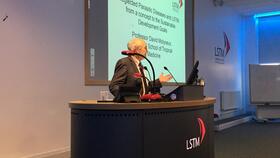Nearly one in six people suffer from NTDs – bacterial and parasitic diseases that disable people and perpetuate poverty. The Global Network for Neglected Tropical Diseases, an initiative of the Sabin Vaccine Institute, is dedicated to raising the awareness, political will, and funding required to eliminate these diseases as a public health threat to the world’s poorest communities.
Since 2006, the Global Network for Neglected Tropical Diseases has been dedicated to eliminating the seven most common NTDs. We work with governments, corporations, NGOs and individuals to raise awareness, and leverage the resources necessary to reach our end goal.
We are passionate about improving the health of the world’s poorest people and believe that controlling and eliminating neglected tropical diseases is critical. To achieve this goal, we work to:
Educate Policymakers
We educate members of U.S. and international governments about the importance of controlling NTDs in endemic countries.
Build Regional Partnerships
The Global Network helps to facilitate partnerships between corporations, NGOs, governments, bilateral and multilateral organizations in order to leverage existing resources and dedicate them to controlling NTDs. We focus on three regions with the highest burdens of NTDs: Africa, Asia Pacific, and Latin America and the Caribbean.
We work with our implementing partners to initiate brand-new programs for NTD control, to bring existing NTD control programs to scale, and to integrate NTD control with other global health programs such as immunization, nutritional supplement programs, bednet distribution, and maternal,newborn and child health programs.
Mobilize Funds
We work to increase funding and engage development partners to bring NTD programs to scale, produce evidence of sustainable impact, and change the landscape of poverty forever.
Expand the Reach of NTD Advocacy
Our NTD Special Envoys provide the political voice and technical expertise needed to control and eliminate the most common NTDs by 2020.



